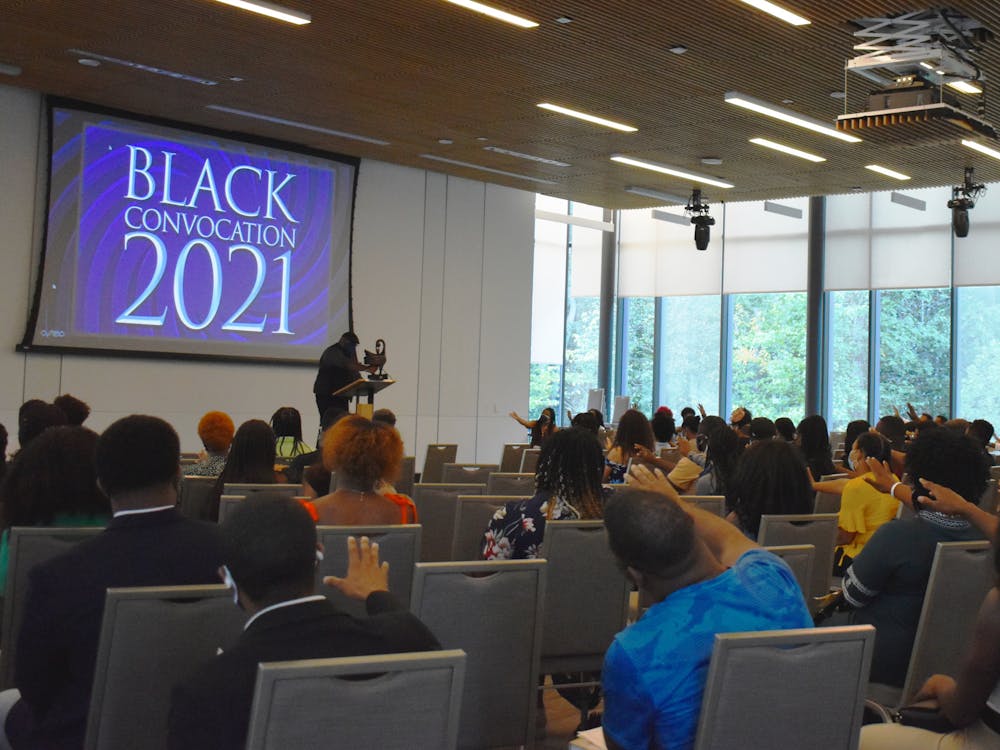Thursday’s seventh annual Black Convocation recognized and celebrated the Black community at Duke.
The ceremony at Penn Pavilion featured undergraduate students, graduate and professional students, alumni, faculty and staff from across the University. They presented opportunities for engagement, highlighted community spaces and urged Black students to aspire for greatness.
Dawna Jones, the newly appointed director of the Mary Lou Williams Center for Black Culture, kicked off the event with a personal introduction and an invitation to the Mary Lou.
“It's important, especially in these uncertain times, that you know where your support lies. The people in this room, especially the folks behind and beside you, are the start of your village. Look around and go out of your way to get to know them,” she said.
She hopes Black students know that the Mary Lou is their “place of refuge.”
“It is the place you will come to be affirmed, to be celebrated and to be in community.”
Martin Smith, dean of academic affairs of Trinity College of Arts & Sciences, recounted his struggles in his undergraduate years and called on students to find service opportunities, reach out for support, pray and recognize their significance to overcome obstacles.
“There's a whole host of people who stepped out on greatness before us,” Smith said. “They planted trees, and in many cases, they knew they would never be able to sit under them … We have no excuse but to be great.”
Quinton Smith, associate director of the Mary Lou, reenacted a long-standing tradition at the Center, where students touch the statue of a Sankofa bird first as a new student, then in their senior year during final honors. The bird represents “the necessity of reaching into the past to honor our ancestors.” He held the statue and encouraged the crowd to reach out their hands.
“I will learn from our past. I will strengthen our present. I will build toward our future as a beloved community,” he chanted with the audience.
Nicholas Irion, learning consultant and student engagement coordinator at the Academic Resource Center, led the audience in a “call and response for community.”
“It is our hope that we honor the legacy of all who came before us and pave the way for those who will come after,” Irion said.
“We dare to aspire to greatness others couldn’t dream of,” the audience responded.
Other speakers highlighted support systems and community spaces for Black students.
Kimberly Hewitt, vice president for institutional equity and chief diversity officer, spoke about how students can get involved with anti-racism efforts at Duke.
“Certainly, there is much we don't know about what we might face in the future. But the energy to make real change and to honor our history, both good and bad, is right,” she said.
Johnna Lambert, Trinity ‘21, introduced various Black undergraduate and graduate student organizations, including the Black Student Alliance, Duke National Pan-Hellenic Council, Black Women’s Union and Nakisai African Dance Ensemble.
Monica Johnson, Trinity ‘84 and chair of the Triangle chapter of Duke Black Alumni, presented on DBA’s efforts during the pandemic and encouraged students to connect with the community and “tap into [DBA’s] alumni network.”
“I hope that you feel empowered and affirmed tonight. I hope that you are thinking about what a loving community means to you. We are here together,” Jones said.
Get The Chronicle straight to your inbox
Signup for our weekly newsletter. Cancel at any time.

Preetha Ramachandran is a Trinity senior and diversity, equity and inclusion coordinator for The Chronicle's 118th volume. She was previously senior editor for Volume 117.

